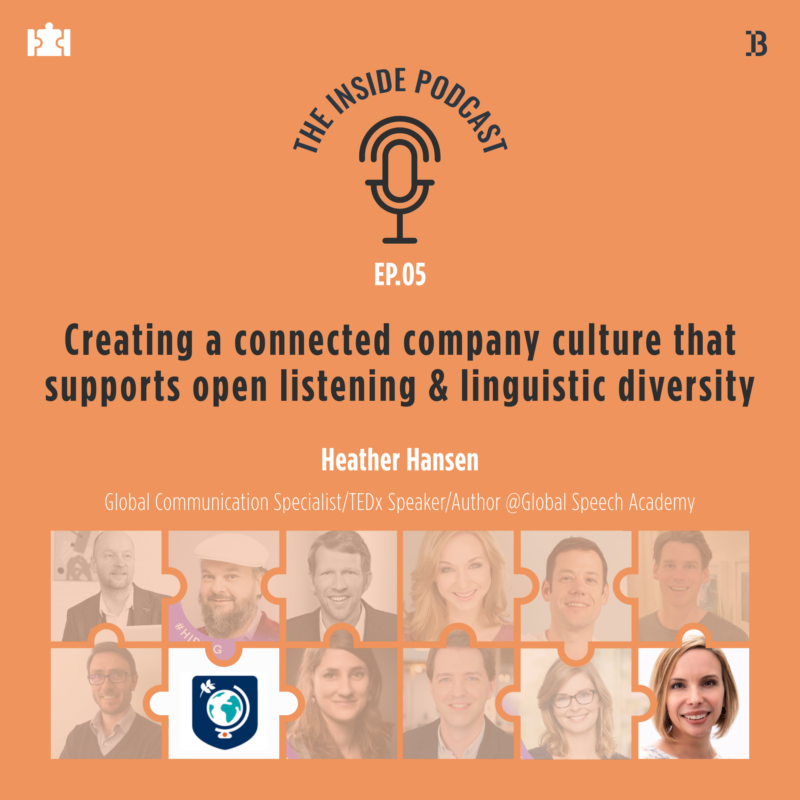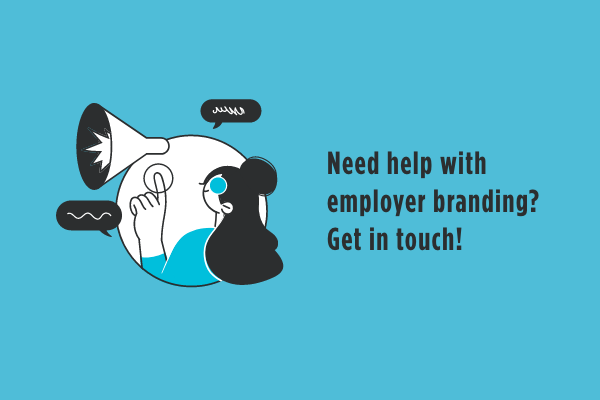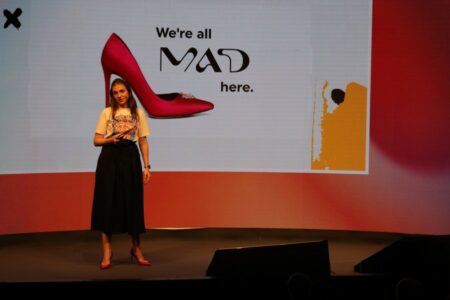Overview
Tune in for Ep.5 of Employer Branding: The Inside Podcast, Season 4!
Because we’re always trying to keep things fresh and interesting, in this episode we spoke with Heather Hansen about creating a connected company culture that supports open listening and linguistic diversity.
Heather is a global communication specialist, TEDxSpeaker, and author at Global Speech Academy. Her recently launched book, “Unmuted”, talks about the importance of linguistic biases at the workplace, but also about daring to show up, speak up, and inspire action.
Tune in to learn more about the different communication methods we can all use to build authenticity, create emotion, feel more more included, and ultimately show our true selves without feeling judged.
What you’ll learn by listening
- Open listening and about linguistic diversity
- Communication is the foundation of leadership
- Creating a connected company culture that supports open speaking and listening
- An overview of linguistic diversity: what it is & why it matters
- Linguistic biases in recruitment: the meaning behind the words and accents
- Guidelines for creating spaces of connection when communicating online
- How voice creates emotion and builds authenticity
About the company
Does your company use English as a global corporate language? If so, Global Speech Academy can help you and your team navigate the proper use of International Business English so you can make the best impression, gain respect and communicate successfully across your teams, with your clients and among global stakeholders.
Global Speech Academy and its Founder and Lead Trainer, Global Speech Specialist Heather Hansen, provide keynote presentations, workshops and one-on-one coaching to top-level leaders all over the world.
Podcast link – Enjoy listening to The Inside Podcast, S04Ep.5!
Podcast transcription
Georgiana: Hi everyone! This is Georgiana with a new episode of Employer Branding: The Inside Podcast. And I have thought of a surprise today because usually this podcast explores leadership management best practices for maintaining a healthy company culture, employer branding teams in general, so to say. Today I’m talking to somebody who is a communications expert, someone who will be telling us a lot about the importance of open listening and about linguistic diversity. I’m really looking forward to welcoming Heather Hansen. Good morning, actually. Good night. I’m sorry, because it’s night in Singapore. Is that right?
Heather Hansen: Yes. But good morning to you. Thanks so much for having me.
Georgiana: Thank you so much for accepting my invitation. You all should know that Heather is a global communications consultant. She is sort of a star, if I can say so, in the linguist communication specialist groups, I asked around a little bit, Heather about
Heather Hansen: Wow, you’ve been doing homework. Well, I’m happy to hear the reputation precedes me.
Georgiana: Of course, and I’m really curious to know what your story is. Like I said, you’re based in Singapore, do you work everywhere around the globe? Or how does it go?
Heather Hansen: Well, I left the United States. I was born and raised in California, I studied international studies in university I also have a bachelors in German, but let’s not go there. It’s been many years since I’ve spoken my German but now I speak Danish fluently. I’m married to a Dane, I left the states 20 years ago this year, on the 4th of July, which is a bit ironic, maybe my freedom day, my independence day from America. And I moved to Denmark to be with my then boyfriend, now husband.
Over the last 20 years, I’ve spent 8 years in Denmark, 12 years in Singapore, going back and forth a couple times. Kids were born here in Singapore. So they’re Danish and American; third culture kids growing up in Singapore primarily. So very interesting kind of international movement personally. And then professionally, I’ve spoken in something like 14 countries at this point across 4 continents and met with a lot of people and dealt with a lot of these issues in global communication. So all of my work is really focused on how we are using the English language in global settings across cultures and languages, to make things work, to get our jobs done. So I do that through speaking, coaching, training, and consulting with primarily higher levels of leadership in multinational companies.
So although you say you know, this is a bit of a surprise, because you’re normally talking about leadership, I would argue that communication is the foundation of leadership. And if leaders aren’t thinking about how they’re communicating with their people, and with their clients, and shareholders and other stakeholders, they’re going to be missing a huge piece of the leadership puzzle. So this definitely underpins the company culture, and the way they are seen as leaders.
Georgiana: And you’ve also written a book, Heather, right?
Heather Hansen: Yes, it’s called Unmuted. I’m very excited about Unmuted. It just came out in March, everywhere from UK to Philippines, and it’ll be out in America and Australia in May. So we’re right in the middle of of all the launches and excitement around the book. Yeah. But I’ve actually, my first book was called “Powerful people skills”. So I’ve been writing about relationships and connection and communication for a very long time. And I’ve contributed to three other books that all deal with the intersection of language, culture, identity, that’s what really interests me, is how we’re showing up in the world and then speaking up and expressing ourselves in multicultural settings.
Georgiana: You know, Heather, I talk a lot with leaders in in tech companies here in Berlin, and in Bucharest, in Romania. And there’s a lot of discussing about transparency, autonomy, diversity, so much so that at some point, you think that, okay, this cannot really mean anything anymore. And then these words, exactly, I came across open listening, and I just stood for a moment and said, Hey, this makes a lot of sense. Why don’t we talk more about that? What does it mean?
Heather Hansen: Yes. And it’s a bit ironic, because I wrote the book, Unmuted, and everyone thinks it’s about simply the speaking side, right. But really, it’s also about knowing when it’s time to press mute, and listen to others. And that’s a huge part of the equation, because many people, I have a framework in “Unmuted” that talks about when we might show up and be too loud, when we might be too soft and when we might be on mute. And it’s not a personality profile.
We can shift between these depending on the context. So for example, in an English meeting, where I feel like I have the upper hand, I can definitely be too loud. And I can overtake that conversation and I can speak over people or interrupt and not listen very well. If you put me in a Danish work environment, even though I’m in Danish, I am very slowly raise my hand, I’m thinking, I’m processing I’m worried I’m not going to make a good impression. It’s hard, because you think, you know, for me, it was, if they could just hear me an English, they’d know how smart I am. Yeah, they would respect me for my ideas. And they look at me like I’m a child, you know? And they have that like, pitiful face like, Oh, I’m so sorry. You can’t speak properly. Or they’ll point out my accent. And if I ever say, well, we can switch to English if you want, you know, I mean, in Denmark, they all speak English. Do you want to do this in English instead? They’ll be like, no, no, no. Or they’ll say, your accent is so charming. And it’s like, we’re in a business meeting.
I’m not trying to be charming, you know, I want to be respected for my ideas. But getting back to the listening bit here. So what happens is, depending on our context, the hierarchy that’s there, where we place ourselves in that hierarchy, how comfortable we are in our relationships, and everything else. We could be in contexts where we over speak, and we don’t listen. Or we could be in contexts where we don’t speak up enough. So we’re looking in an unmuted workplace to find the right balance of turning down those voices that are too loud, turning up the ones that are too soft, and creating a connected and psychologically safe environment and community; and company culture that supports open speaking and listening.
And it’s really just all about knowing when to press that mute button, making sure that you’re listening beyond the accent, beyond the words or the normal, perfect English. And you’re hearing the messages that people are bringing to the table, that you’re including everyone at the table that everyone has equal talk time. That’s the only way that we can find more inclusion, that we can have more innovative ideas, and take the company forward.
Georgiana: Right? And is linguistic diversity, sort of the same thing? How is it different from regular diversity?
Heather Hansen: Linguistic diversity is underpinning a lot of the discrimination that we see. We talk a lot about race, we talk about neuro diversity, we talk about physical ability, gender, sexuality, all of these things we talk about very openly. But we forget that all of those forms of discrimination are wrapped up in language. So when we talk about linguistic diversity, what I see happening in a lot of organizations is they will say, use inclusive language.
For example, Don’t say you guys, because that’s not including women, for example. That’s a real basic one. And I think it goes much deeper than that. Because the world’s language in business is English, which means anyone born into English has an automatic privilege, and step up in the world. When it comes to sitting in that business meeting, we’re automatically going to be more familiar with the language, we’re more comfortable in the language, we don’t have the layers of thinking going on and the mental load that’s happening for people who don’t have English as their first language. We maybe have it as the fourth or fifth language. And that is where we already see privilege happening.
On top of that, when we combine that with accents and the way people sound when they open their mouth, we immediately judge people by how they sound if you think of every movie you’ve ever watched as a child growing up, right? And the villains, the bad guys, they never have that like, really nice American Hollywood voice, right? They never do. They’re German, Russian, Eastern European, Arab, we have made it very clear in our films, us versus them, or they’re British, right? A lot of British villains. They’re either villains or they’re sexy doctors, it’s kind of changed over time. That’s because our impressions and our bias is changed, right? And as as new generations grow, we have different impressions and relationships in the world. So it’s quite interesting, but we do have studies that have shown that there can be linguistic biases in hiring decisions and promotions at work. Due to people hearing an accent, having a negative impression of that accent, and not really listening fully to the message, the meaning behind the words and the accent. And that’s where it gets really dangerous in our workplaces.
Georgiana: In my opinion, the values of the team come exactly from the multi-culturality, from the accents and from being as diverse geographically and I don’t know, culturally as possible.
Heather Hansen: I absolutely agree. I mean, that’s where we get the new ideas. And we all think differently, we come from different cultural backgrounds, we have different linguistic backgrounds. And when you bring all of that to the table, it’s so exciting. And in some ways, we wipe that out, right? When we hire people, we look for people who will be a cultural fit. Well, it doesn’t matter if you hire for demographic diversity, if you’re just looking for the minority female, so that you fit that diversity demographic, and yet, that minority female went to the same schools as you, grew up in the same culture, speaks the same language, the cognitive diversity is not that different. And what we need is the cognitive diversity of different ideas being brought to the table from different people, and we have to be listening to them. It doesn’t help if we just bring people in and expect them to conform to our culture. And if they don’t, then they’re out in six months. That doesn’t help us.
Georgiana: I was wondering, especially in these cross cultural teams, and especially nowadays, when we work, when all of us work remotely, there’s so much miscommunication, which sometimes is based on linguistic differences, what can a team leader do to prevent it or to fix situations when they occur?
Heather Hansen: There are a lot of misunderstandings that can happen due to simple language, mistakes, errors, misunderstandings. What’s interesting to note is that often it is the native speaker that can cause the most misunderstandings in the global workplace. Because we come in as Americans or Brits, or Australians and, and we believe that we speak the language perfectly, right? And we think, Well, yeah, I’m speaking English. Yeah, it’s your job to speak in a way that I can understand because I’m the English speaker here.
But we forget that when you go into the world, it’s very different from the English we were raised with at home. I can’t use all the sports analogies and cultural analogies that I would use with friends back home or my family. Many of these are so built into our communication, we don’t even know how to translate them; things like ‘touch base’. Every single office in the world in English to say, just touch base next week. Well, that comes from baseball. I mean, than actually comes from American sports. And we don’t even know how to translate it. And people have said, how would you translate us? Next week, I will email you next week. I will contact you next week. It sounds so strange, right?
So when we come into situations, we’ll do that a lot. You know, I say things like the whole nine yards. That’s American football. I mean, who even knows anything about American football? I personally slip and say it all the time, like, oh, the whole nine yards. It’s like going all the way. It’s just, it’s funny. And we have to catch ourselves and understand that people aren’t going to say I’m sorry, what? I don’t understand that. Because usually we’re in a position of greater power and authority. Because we have control of the language. People think that we’re very eloquent. They don’t want to interrupt us. They don’t want to say, I’m sorry, I don’t understand what you’re saying.
And so we go around thinking everybody understood. We say things like, Oh, does everyone understand? And then leave the room. That’s not checking for understanding.You have to actually ask people at the end of the meeting. What’s your next action point? What are you taking from this meeting? What’s the next goal? What will you have finished by next week? You have to check in and make sure they have understood and have them relate that back to you instead of just saying, Did everyone understand? Everyone says, yeah. And then they leave and they do something totally different.
Georgiana: Because they’d be ashamed.
Heather Hansen: Exactly. They’re embarrassed, right? I mean, we don’t want to be embarrassed in front of our team. And it’s something a lot of people struggle with, and I struggle with when I have to operate in other languages.
Georgiana: I know, I know. Neither English nor German is my native language. And I have to say, I don’t struggle with English as much because I’ve studied it for many, many years. But German is really difficult.
Heather Hansen: Do you ever mix them a little bit?
Georgiana: I also speak French fluently. So now I mixed a little bit of French with Romanian and German and English. And it’s really, it’s unusual and uncomfortable, and it’s not getting any better because I’m in this expat international community where even the Germans are going to speak English to me.
Heather Hansen: Yep, it’s absolutely true. I was very lucky that I moved to Denmark when I was still young, in my 20s, because I was able to get a job as a bartender. And that is where I learned all of my Danish. Honestly, I did take three years of night classes, but then working in a bar with a bunch of drunk Danes, if you can understand drunk people, you can understand it. And I picked up so much of the cultural nuances and the jokes and that was where I was forced to use it. I was at a stage where I could understand, but I couldn’t speak.
And after working there about six months, I could fluently speak and carry on conversations, of course, around certain topics. It didn’t help me so much in business, but essentially, it’s a starting point. But it’s that idea of being in a in a situation where you don’t feel so scared to make mistakes. And that goes back to that idea that we don’t like to feel embarrassed as adults, especially in our working relationships and on our job, because we know what to do. We know our job, we have confidence in our own language. And we’re just struggling with trying to express that in the environment that we’re in.
And that’s something leaders really have to stop and think about when they’re dealing with a multicultural and multilingual team, is just because someone isn’t speaking up doesn’t mean they don’t have something to say; it’s very likely they do. And I mean, I’ve been in so many meetings where I did have something to say, and just when I finally figured out how to say it, and it put it all together in my head, and I’m about to raise my hand, it moves to the next topic.
Georgiana: Or it somehow doesn’t amount the way you planned it in your head.
Heather Hansen: Yeah. And then so you start talking, and then you’re trying to fix it, and then you just feel stupid, and then you just stop, right? And then you don’t want to do it the next time. So this is happening every day in every office across the world, where we’re using English as a lingua franca, a common language. And we just need to be aware of it and aware of our own biases when we go into these situations.
Georgiana: This is very, very valuable information. This is something that I could share with all of the CEOs that I talk to here in the tech scene in Berlin. Because the Berlin tech scene is extremely multicultural. And I’m sure a lot of miscommunication occurs here. But now, I’m wondering, is unmuted communication really possible when people are working remotely, when you add yet another obstacle, another barrier: the computer.
Heather Hansen: The computer, you know, I think there are pros and cons, because the our zoom communication and and video conferencing actually slows down the communication a little bit. So we have these lows and lags in the conversation. And in some ways that can help. Also, the idea of some people being able to turn off cameras, for more introverted people, sometimes they would prefer to just speak and not be seen.
Or maybe they’ve written something down in front of them. And they want to read that because it makes them feel more confident. So there are certain ways that this kind of online communication could be helping us. Also, more reliance on email. I mean, we’ve been very focused on video conferencing over the last two years, because it’s newer for us. But really, email remains our main mode of communication, either email, or messaging, things like Slack, or WhatsApp, using teams chats, and we’re really communicating a lot in writing more than I think many of us realize.
And when we do communication and writing, we have more time to think as well and rephrase and reformulate our words or look things up if we need to. And so online communication does slow things to some degree, allowing for fewer misunderstandings in some cases. But we could look at the flip side as well and say, Yeah, but now we don’t have any of the body language. We don’t have the connection, we don’t have that ability to feel the energy of the room in the same way. But I have argued for the past two years that if we really think it through, I think we can create spaces of connection online. You know, even us sitting here talking right now, I feel like you’re right across the table from me. It feels like we’re right here. And so I think it depends on the people, the individuals and how confident they are with the technology and we’re all learning. We’re all getting more comfortable.
Pretty soon, I mean talking about tech, we’ll be going into the metaverse and communicating through avatars and then we don’t have any body language other than something that’s constructed. And we’re gonna go back to voice. What’s interesting though, is that a lot of the research shows that voice is the most powerful, so when we have a voice connection like the telephone we can actually feel more emotion than when we have the visual. You can hear that emotion and it’s a lot like the new audio chat rooms and things, Clubhouse or Twitter spaces or you know, all these different audio social networks. We’re finding that and I don’t know, have you ever been in those? Or have you been active in them at all?
Georgiana: I did toy around a little bit with Clubhouse in the beginning, but then I abandoned it. It’s fairly new.
Heather Hansen: I was in there for probably about six months or so. And some of the connections I made in Clubhouse are stronger than any social media platform ever. And there are people probably some of the people you’ve talked to about me when you did your research. I probably met them on Clubhouse because for some reason, hearing people’s voices without having the visual distraction allows us to tap into the emotions, and we feel that person more fully. And I found that being in that audio space, even though I don’t prefer audio, to be honest. I would much rather read or see something on paper or speak face to face. But in that audio space, you could feel people’s authenticity. And it was quite interesting.
So as we move into the metaverse, I think and into, web three worlds and Metaverse style avatars and things, we might end up going back to that more audio connection. So I think the future holds some very interesting things for the way that we communicate the way we build community. Even looking at NFT’s, going into that space of community building and how our communication is changing in Discord channels and, and a lot of it is very much audio based and written. And I think that is leveling the playing field a little bit to use another sports analogy, leveling the playing field, but making things more equitable. Because we go into these spaces and you don’t know skin color, you don’t know gender, a lot of people are using names that are not their own. I mean, I’m Double H if you find me in Discord.
And you don’t know if I’m a man or a woman or where I’m from. And that creates this very equal. We can create this new equality in in this web three world. So I find it really fascinating if you’re working with a lot of tech or if our listeners are in the tech fields, I think they also have a strong responsibility to make sure that that continues and that we build a world that’s better than the one we’re in. And a lot of that comes down to communication.
Georgiana: But you know, I’m getting this question a lot from from some of my friends. How does an introvert leverage active communication or open listening?
Heather Hansen: Yeah, I think especially looking into the future, introverts have many more ways of getting involved in conversations and feeling more comfortable. Simply the fact that you can turn off the camera and be in your own space, assuming you’re in a culture that allows that I am actually one who argues that people should be allowed to turn off cameras, unless we’re in small group discussions. If I’m giving a talk to hundreds of people, there are many speakers were like everyday turn on your cameras, I want to see you, I typically don’t do that. Because it really only serves me. It’s not serving people listening, it’s only to feed my ego and be able to see all the smiling faces going, Oh, Heather, this is so great. And I have to trust that my communication is landing. And if people aren’t comfortable, and don’t want their camera on for whatever reason, maybe they don’t want me seeing their living room, then so be it. I’m going to give them that space.
There can be people coming in and out, or they’re in their car or whatever. So it’s about giving that space. But I think that this serves the introvert in many ways because it allows them to participate to a level that they’re comfortable with. Also, if we look at things like Discord or the online chats and more writing, they have more time to decide how they want to engage. So I do feel that for introverts, it can be a better new world for them moving forward as long as their leadership is willing to honor that, and give them that space. You know, just because people are introverted, it doesn’t mean they don’t have something to say or they they aren’t engaged or they don’t want to be involved. Introvert, extrovert you know, I find it’s a huge generalization as well because we can cross over these lines so often.
Georgiana: So we can exchange even ourselves, we can context be introverts and in other extroverts, I agree
Heather Hansen: Exactly, some groups can drain me completely, other groups can give me a lot of energy. And when we’re in now, this new online space, we really do have a lot more options as to how much we participate. And if I’m having a really hard day and I’m very tired, even I want to turn off my camera. I don’t always want to be on display. So, even though I tend to be more extrovert worded but more and more over these last two years, I’ve been like, oh, do I really have to turn on my camera? Do I really have to get involved in the chat? Like, can’t I just sit here and listen? And I think a lot of people are starting to feel that way. So we just need to be aware of that and be inclusive of everyone at whatever level they’re at and where they are on that day at that time. And trust that our communication is landing that people are engaged in the way that suits them best.
Georgiana: Heather, I’m also mindful of the time here, and there’s two more things I want to ask you. One of them regards the types of companies, types of organizations you’ve witnessed so far. I’m really curious. I mean, it’s I know, it’s difficult or practically impossible to find a universal recipe so to say, but what does a company look like when open listening is the norm?
Heather Hansen: Hmm, I wonder if that company exists. To be honest, I think that we know what the goal is; we know that we need to be better listeners, we know that we need to be more inclusive. I’m yet to find a company who fully embraces that at all times. I think that companies who are trying to move in that direction, have leaders that are very self aware, that have set expectations in their teams who talk about this openly to say listen, our goal is to be inclusive of everyone’s ideas. Some companies have actual things in place, for example, you go into the meeting, and first of all, an agenda has been sent beforehand. So everybody knows what is coming.
The team lead may have actually reached out specifically to different people to say listen, I really want to hear your views on this point or that point. I expect you to contribute in these areas so that they can prepare themselves. This is especially good for people with language difficulties, or who are a little more introverted or a little bit fearful of speaking up in a meeting. They have more time to prepare, maybe write notes and do that. And then in the meeting itself, people come in with their written notes and opinions about an idea and actually get equal time to share those notes and ideas without being swayed by the people who went before them. We’re very biased to listen to the first person with a good idea and say, oh, yeah, what she said, that sounded really good.
That’s what I wanted to say, kind of, but not really. But it sounded really good. And I agree. And then, by the time it’s my turn, I say, Oh, just what everyone else said. Actually, my notes on my paper were different. I was thinking something different when I entered that room, and I was swayed by the others. And so that idea was lost. And maybe that was an idea that could have brought new perspective. So companies that are working towards this have actual policies and systems in place to enhance listening to enhance inclusion and equal opportunities to express our ideas.
Georgiana: Absolutely, I totally agree. And again, this is very, very useful input. Before we get to the end of this discussion, I was wondering, what is the one very valuable resource that’s helped your career so far?
Heather Hansen: What has helped my career is more of a resource that I like to share with my clients, because I think it teaches us a lot. There is a report that is put out every single year and it’s been put out for, gosh, over 20 years now, maybe 20, about 25 years. It’s called the Edelman Trust Barometer. And they are measuring trust in all different areas of our lives in business, how much do we trust our governments, nongovernmental organizations, business, the media, and they measure this yearly. And what we found is as of last year, it’s basically we are in a trust deficit.
Businesses are the most trusted by the general population, but they score something like a 52 or 56 out of 100. So they’re like the best of the worst, right? But yet, we’re still calling on leaders to stand up and speak out in the world for causes and to fix things that are wrong. And I use this report every year just to show my clients where we are and how important it is to build our communication skills, and what areas we need to look at to do that. So if you aren’t familiar with Edelman Trust Barometer, any of the listeners, please do look it up. I think it’s an amazing report that can give you a lot of insight into how you go about building your relationships and building trust in your business and with the public as well.
Georgiana: Okay, we’ll do for sure. Heather, this has been lovely, very informative, and very pleasant as well. Thank you so much for accepting my invitation. And I wish you the best of luck with the new book promoting it, and with your career and I hope we can stay in touch.
Heather Hansen: I hope so. Thanks so much. It’s been a pleasure.
This was Employer Branding: The Inside Podcast. You can find our podcasts on Spotify on Apple podcasts and content on employer branding-related things on employerbranding.tech. Until the next time, stay tuned.







